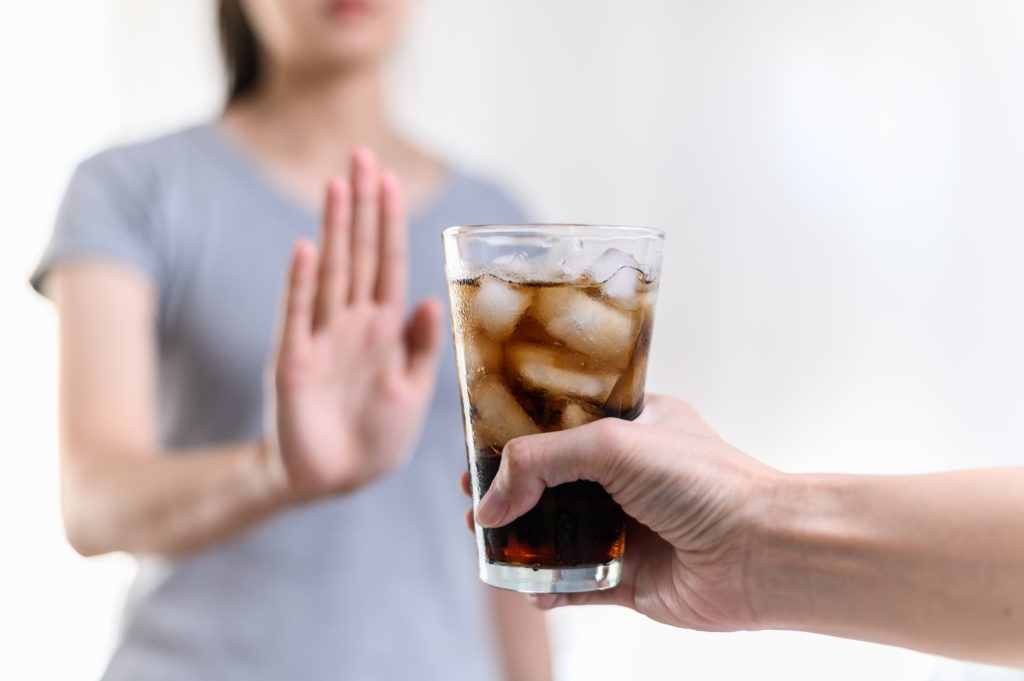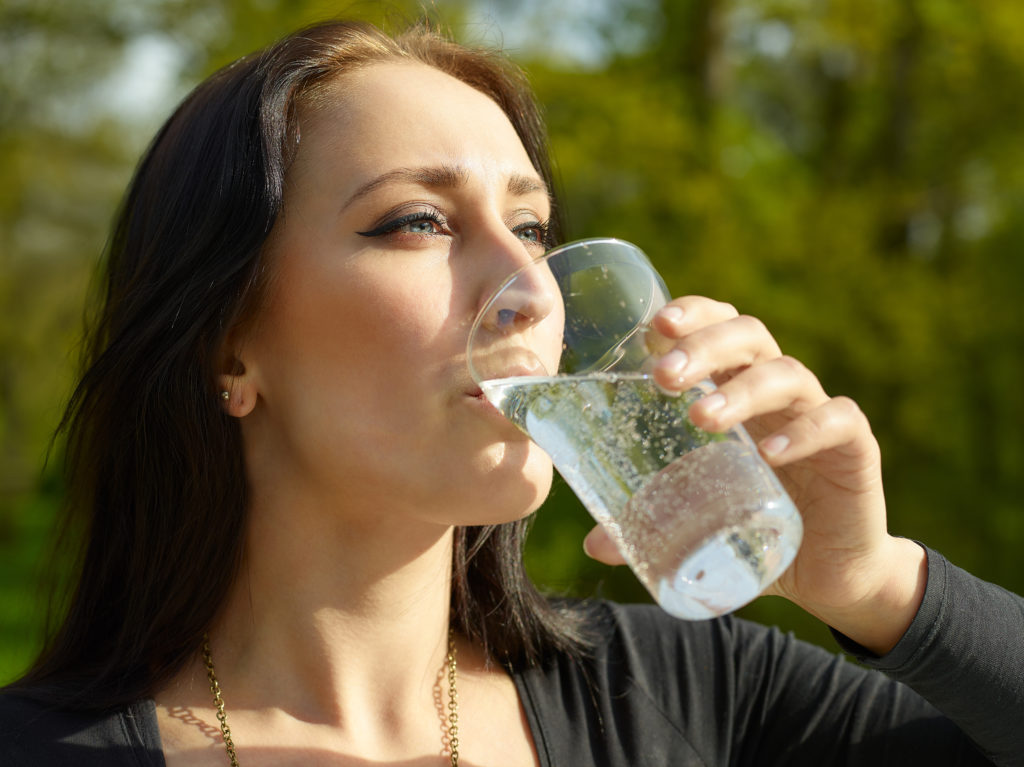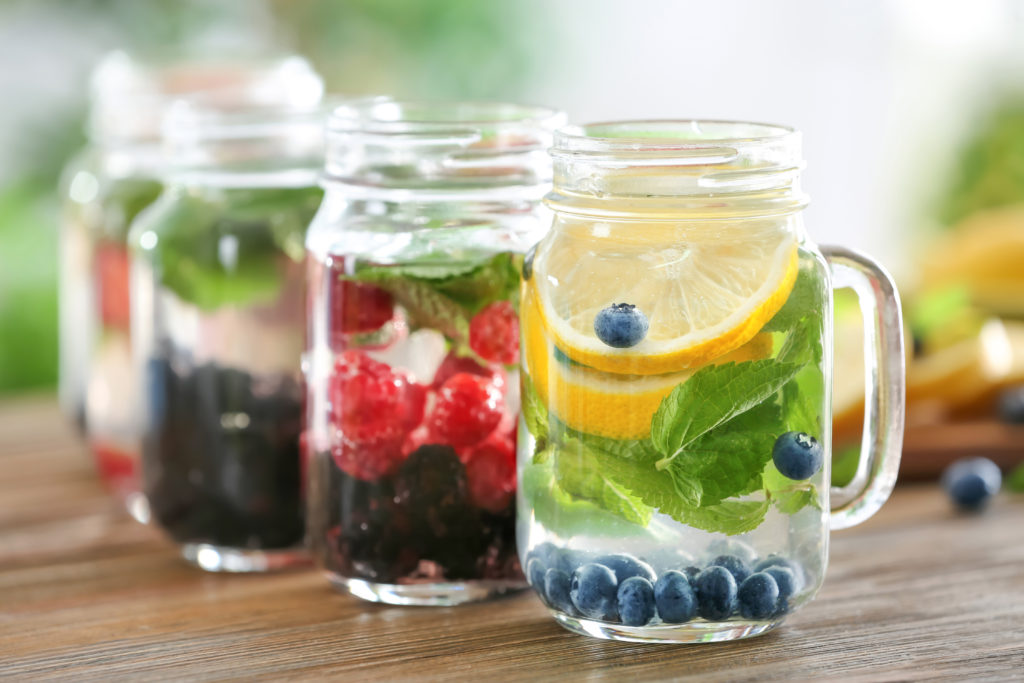January 17, 2023
Soda Busters: 7 Tips to Sip Healthier
The average American adult downs 39.6 gallons of soft drinks every year—that’s about
20 pounds of sugar in one year—from soda alone! Many of these drinks contain the entire recommended daily sugar intake in just one 12-ounce can. So, if you drink three a day, you’re consuming three times the recommended daily amount of sugar.
No wonder diabetes rates are soaring.
Along with being expensive, sodas really don’t have any redeeming worth. They provide little to zero nutritional value.
So why are we so hooked? They taste good. In fact, they taste so good, one sweet sip is never enough. Sodas, energy drinks, juices and double mocha lattes — we love them. That’s great news for the beverage industry, bad news for your body.
Soda has been linked to a long list of health problems —obesity, diabetes, cardiovascular disease, tooth decay — even certain cancers. But sodas aren’t the only culprit. Any sugary drink makes it easy to lose track of how many calories you consume in a day. Plus, sugary calories are easily turned into fat.
Check out our strategies for kicking your soda and sugary-drink habit.
Keep soda outta sight, outta mind.
Make sure you keep soda out of your eye-line and out of reach. Clear sodas from your fridge and keep them out. Avoid the soda isle at the grocery store. Steer clear of vending machines at work. Avoid soda fountain stations at convenience stores. Skip fast-food drive thrus—it’s too tempting to order a giant soda with your food. If you do order from a fast-food restaurant, choose water or a cup of coffee.
Don’t go cold turkey.
As much as you might want to wean yourself from sugary sodas, going cold turkey can be hard. For the first few days, allow yourself just one small soda—no more than 12 ounces. Drink it with lunch or in the early afternoon. Afterward, switch to water to help stave off additional sugar cravings.
Don’t fall for the sugar-free diet trap.
Sure, switching from regular sodas to diet sodas may seem like a good idea. Especially since they have zero sugar, zero calories and zero carbs. Still, studies show artificial sweeteners can actually boost your cravings for sugar and fuel weight gain. Other ingredients have been linked to both short-term and long-term health issues. Everything from eroding tooth enamel and weaker bones to a higher risk for heart disease, stroke and Type 2 diabetes. When you trade regular sodas for diet sodas, you don’t gain anything on the good health front.
Explore other tasty options.
 Enjoy sparkling water or seltzer when you want something carbonated. Just make sure you choose ones without sugar, high fructose corn syrup and artificial sweeteners. Coconut water is naturally sweet and a refreshing option. Or try Kombucha, a fermented probiotic drink that is slightly tart and sweet. Loaded with antioxidants and B vitamins, this fizzy beverage is a good energy booster. Choose varieties without added sweeteners. Cool off with a no-calorie classic—unsweetened black tea brewed without additives. Recharge with a refreshing iced coffee made from black, unsweetened Joe and skim milk.
Enjoy sparkling water or seltzer when you want something carbonated. Just make sure you choose ones without sugar, high fructose corn syrup and artificial sweeteners. Coconut water is naturally sweet and a refreshing option. Or try Kombucha, a fermented probiotic drink that is slightly tart and sweet. Loaded with antioxidants and B vitamins, this fizzy beverage is a good energy booster. Choose varieties without added sweeteners. Cool off with a no-calorie classic—unsweetened black tea brewed without additives. Recharge with a refreshing iced coffee made from black, unsweetened Joe and skim milk.
Discover a new way to go green.
When it comes to good-tasting and good for you, green tea gets the green light. Chock full of antioxidants, researchers have found that green tea can reduce your risks for hypertension, heart disease and cancer. Green tea also blocks LDL (bad) cholesterol and increase HDL (good) cholesterol. It’s even been shown to improve brain function, boost the body’s metabolism and burn fat! One to three cups of freshly steeped green tea a day is best. But you can also find bottled unsweetened green teas at many stores. Drink up!
Jazz up your Joe.
Can’t imagine starting your day without your favorite coffee-bar drink? Did you know some of your favorite lattes, cappuccinos, macchiatos and mochas pack more calories than a Big Mac? It’s better to get back to basics—a well-roasted, freshly brewed cup of java enjoyed black or spiced up with a few low-calorie options.
Try adding these to basic black coffee:
- A few drops of a flavored extract—vanilla or almond are great
- Skim milk and one sugar-free marshmallow
- Skim milk, sugar-free chocolate syrup, one sugar-free marshmallow
- Skim milk, sugar-free chocolate and sugar-free caramel syrup
Drink oh-so-delicious H2O
Instead of soda, quench your thirst with a big glass of water. You know it’s good for you. After all, nearly 60 percent of your body is composed of water. It carries vital nutrients to every cell in your body. It flushes toxins and waste and regulates body temperature, aids digestion, lubricates our joints and more. Plus, drinking eight 16-ounce glasses of water a day can raise your metabolism and burn up an extra 100 calories!
A lot of people find water a boring or don’t like the taste. If you’re one of them, wake up your water with one of these easy, flavorful ideas.
Citrus Quencher
- Slice 1 orange, 1 lemon and 1 lime into rounds – then cuts rounds in half.
- Place fruit in the bottom of a large pitcher or Mason jar.
- Gently press fruit with a wooden spoon to release juices.
- Fill pitcher with ice. Add just enough water to top it off.
- Stir and chill in fridge.
Raspberry Lime Delight
- Add 1 carton of fresh raspberries to a pitcher or large Mason jar.
- Gently press berries with a wooden spoon to release juices.
- Cut 2 limes into quarters.
- Hand squeeze the juice from each lime into the pitcher adding to pitcher.
- Fill pitcher with ice. Add just enough water to top it off.
- Stir and chill in fridge.
Watermelon Cooler
- Add 1 or 2 fresh sprigs of rosemary to a large pitcher or Mason jar.
- Press gently with a wooden spoon to release its flavor.
- Add 3 cups of watermelon cubes to the pitcher.
- Gently press with a wooden spoon to release juices.
- Fill pitcher with ice cubes.
- Add just enough water to top it off.
- Stir and chill in fridge.
Did you know? Using a straw to drink water helps you take in more agua than sipping from a glass.
Most guidelines say you should drink at least eight, 8-ounce glasses of water a day. The exact amount depends on your weight, age, activity level, environment and any health issues you may have. Talk with your care provider to see how much water you should drink each day.
DISCLAIMER
The information featured in this site is general in nature. The site provides health information designed to complement your personal health management. It does not provide medical advice or health services and is not meant to replace professional advice or imply coverage of specific clinical services or products. The inclusion of links to other web sites does not imply any endorsement of the material on such websites.